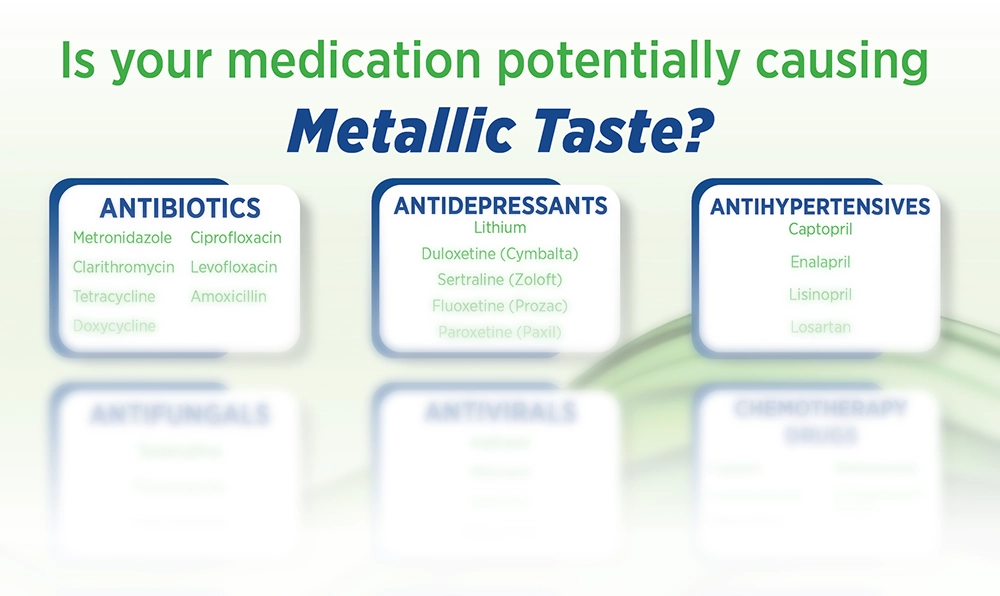



Dysgeusia (dis-goo-zhuh) is a disorder that affects your sense of taste. This taste disorder’s effects are long lasting bad, metallic, or change in flavors on your tongue. Although dealing with dysgeusia is not usually serious, it can really impact someone’s quality of life. It can make it hard to enjoy food, which can affect appetite and nutrition. Luckily, finding the underlying cause is often the first step for management. Many people can find relief through different treatments and lifestyle changes.

Imagine biting into your favorite food, but it tastes like metal or has a strange, bad flavor. This can happen to people with dysgeusia, a taste disorder that makes everything have a “bad taste in the mouth” that doesn’t go away.
Dysgeusia is more than just not liking a flavor. It changes how your taste buds work and send taste signals to your brain. This can show up in different ways. You might struggle to taste some flavors or sense a strange or altered taste, even when there is no food around.
Dysgeusia comes with several symptoms. The most common is a constant, unpleasant metallic taste in the mouth. This taste can happen now and then or be there all the time, affecting how everything you eat tastes. Some people may also notice other strange flavors like a bad, salty, or spoiled taste, making mealtime difficult. In addition to these strange tastes, some individuals experience a loss of taste, called hypogeusia. This can make it hard to know what flavors are in food, so meals may seem bland and unappetizing.
Dysgeusia, a taste disorder, can be caused by various factors such as medications, dental prostheses, deficiencies in certain vitamins and minerals like zinc and vitamin B, and tongue inflammation. Taste receptors play a crucial role in how we perceive flavors, and any disruption to these receptors can result in an altered taste sensation. Saliva also has a protective role in maintaining the health of taste receptors in the mouth. Dry mouth, medically known as xerostomia, is a condition where the salivary glands are not producing enough saliva to keep your mouth moist enough to prevent bacterial growth and may result in cavities and infections. Xerostomia could be a factor in why you’re experiencing dysgeusia.
Dysgeusia can seriously affect a person’s quality of life. Enjoying food is important for social events and cultural traditions. Not being able to enjoy food can create feelings of isolation and frustration. Plus, the ongoing unpleasant taste can cause a loss of appetite. This may lead to weight loss and problems with nutrition.
The reasons behind why one may experience dysgeusia can be quite different. They can include temporary issues like a cold or long-term problems such as nerve damage or vitamin deficiencies. Finding the main cause is important for treatment.
Dysgeusia can be caused by various factors such as smoking, medical conditions, medication, and poor oral hygiene. Poor oral hygiene can lead to an altered sense of taste due to the buildup of bacteria in the mouth. To address dysgeusia caused by poor oral hygiene, it is important to maintain good oral health practices such as regular brushing, flossing, and dental check-ups. Additionally, avoiding tobacco use and seeking treatment for any underlying dental issues can help alleviate this taste disorder.
Many medications, especially those used in chemotherapy, often lead to dysgeusia. Certain health issues like diabetes, liver disease, and nerve disorders can also be factors. Furthermore, not getting enough important vitamins, especially zinc and B vitamins, can change how our taste functions, causing dysgeusia.
Dysgeusia, or altered taste, is a common side effect that can occur days to weeks after beginning cancer treatment. Several factors can contribute to the development of dysgeusia, some of these included:
Beyond medicines and chemical exposure, some health problems can also lead to dysgeusia. For example, diabetes affects blood sugar control and can harm taste sensitivity. This happens because it may cause nerve damage. The damaged nerves, known as diabetic neuropathy, can lessen the ability to know the difference between sweet, sour, bitter, or salty flavors.
Neurological disorders like Parkinson’s disease, Alzheimer’s disease, and multiple sclerosis can affect the brain areas that process taste, or the medication can lead to dysgeusia. People with these conditions could also have changes in what foods they like or experience strange tastes.
Moreover, not getting enough nutrients, especially B vitamins and zinc, can cause issues like dysgeusia. These important nutrients are crucial for keeping taste bud cells healthy. Without them, your ability to taste may decline.
Dysgeusia management usually starts with a thorough check-up by a healthcare provider. This often includes asking about your medical history. They will gather information about your current medications, any chemical exposures, past illnesses, and lifestyle habits because these details can help them gather a clearer picture of what might be happening.
While looking at your history, the provider may also do a physical exam of your mouth and throat. This is to find any clear issues or infections. To better understand the cause and measure how your sense of taste is affected, the provider may suggest special taste tests.
A professional check for dysgeusia usually includes tests to evaluate how you taste. One common test uses different solutions that have various flavors. A healthcare provider will ask you to sip, spit, and rinse your mouth with these solutions. Each one shows a certain flavor, like sweet, sour, salty, bitter, or umami (taste sensation that is produced by several amino acids and nucleotides.) After that, you will try to identify each taste. The lowest amount of flavor you can recognize tells your taste sensitivity.
Other tests, your healthcare provider might suggest blood tests to check for bigger problems like vitamin deficiencies, diabetes, or thyroid issues because these can affect how you taste. If there’s a chance of nerve damage, tools like Magnetic Resonance Imaging (MRI) may be used to look at the nerves that send taste signals.
Blood tests give important information about your health. If you have dysgeusia, these tests can help find the reasons behind the issues. They can spot missing nutrients, especially B vitamins like B12 and folate, and zinc. These nutrients are key for healthy tastebuds. Blood tests can also check your blood sugar. This is to ensure you do not have diabetes, which can hurt your taste because it can damage nerves.
Imaging methods, like magnetic resonance imaging (MRI), are very helpful. They let doctors see inside your body, including the brain and nerves that send taste signals. If there’s a chance of nerve damage or other brain problems causing dysgeusia, an MRI can create detailed images. This helps doctors find any issues that might affect why you have a problem with dysgeusia.
Though blood tests and imaging do not directly diagnose dysgeusia, they are important for checking for other health issues. They help doctors find what might be causing your taste problems. This information helps in making a treatment plan that addresses both your dysgeusia and any health concerns you might have.
Fortunately, oral dysgeusia can get better with treatment. This treatment usually focuses on finding and fixing the underlying cause. Once doctors figure out what is causing the problem and treat it, the distorted sense of taste often improves. But this can take time because taste buds heal slowly, so patience is important.
While addressing the underlying cause, there are effective ways to go about dysgeusia management. People can use different strategies to lessen the effects of altered taste perceptions. These tips include simple changes in diet and alternative therapies. They aim to make food taste better, improve oral health, and help restore the enjoyment of eating.
One easy and effective way to practice dysgeusia management is to change your diet. Start by finding out which foods or drinks make your taste problems worse. You might want to avoid spicy foods, citrus fruits and juices, fizzy drinks, and artificial sweeteners, as these can make bad tastes even stronger.
Eating simpler foods can help make meals easier. Think about adding foods like plain chicken, rice, potatoes, and yogurt. These options are less likely to cause bad taste. Also, try to eat cold or room temperature foods. Hot foods can make flavors stronger and might make your taste issues worse.
Using artificial saliva or oral moisturizers can help, especially if dry mouth is making your taste problems worse. These products can help your mouth stay wet, which may improve how your tastebud’s work. It’s also important to keep up good oral care. Brushing, flossing, and using mouthwash regularly can keep your mouth healthy and help you experience taste.
Living with oral dysgeusia can be tough, but it is manageable if you have the right plans. Adjusting to a life with an altered sense of taste means focusing on good nutrition, trying different cooking methods to improve flavors, and taking care of your mental well-being.
Joining support groups or talking with others who also have taste issues can give you helpful emotional support and advice for dealing with daily challenges. Sharing your story with people who understand can be very empowering. It helps to feel like part of a community, especially during times when you may feel lonely.
Living daily life with dysgeusia can require you to change your routines and eating habits. Having a constant unpleasant taste in your mouth can make meals less enjoyable. This may lead to less appetite and cause weight loss you didn’t intend. To help with this, check out this blog: Get Rid of Metallic Taste for some different solutions that could help you or a loved one move past this annoying problem.
The temperature of food can really affect how you taste it. Cold or room temperature foods usually have gentler flavors, which might taste better for those with dysgeusia. On the other hand, hot foods can make the distorted sense of taste worse and take away from the eating experience. So, think about changing the temperature of your food to see what suits you the best.
Using plastic utensils instead of metal ones can help too. Metal cutlery can cause a metallic taste in your mouth, which makes tasting foods harder. By using plastic utensils, you can get rid of that extra taste issue and enjoy your meals more.
If you’re experiencing an unusual or unpleasant taste in your mouth, MetaQil is the ideal solution to help alleviate it. Unlike typical mouthwashes that can be harsh and burning, MetaQil offers a gentle, soothing experience with its mild flavor, because there is no alcohol to aggravate the tongue. Its unique formulation includes essential oils clinically proven to alleviate taste disorders, effectively addressing issues such as metallic or bitter tastes. With MetaQil, you can enjoy a more comfortable and refreshing oral experience, allowing you to fully appreciate your food and drink without the interference of unpleasant flavors.
In conclusion, it is important to understand dysgeusia. This understanding helps with better management and a better quality of life. By recognizing the symptoms, causes, and ways to diagnose it, people can look for the right treatments and make changes to their lifestyles. This can include diet changes, medical help, or emotional support. It is key to address dysgeusia in a complete way. If you or someone you care about has taste problems, it is a good idea to talk to healthcare experts for personal advice. By improving awareness and understanding, we can better support those who have dysgeusia.
Bland foods are good for sensitive taste buds. Things like plain yogurt, rice, unsalted crackers, and cooked vegetables are gentle on the mouth. You should avoid foods that are too sweet, sour, spicy, or bitter. These kinds of foods can make dysgeusia symptoms feel worse.
Dysgeusia is when your sense of taste is messed up. This means you may taste things wrongly, often feeling them metallic, bad, or rotten. Ageusia, however, means a complete loss of taste. In this case, a person cannot taste any flavors at all.
